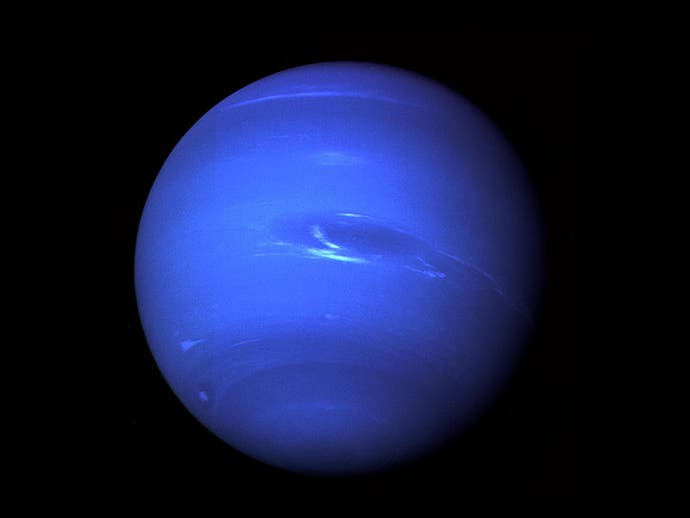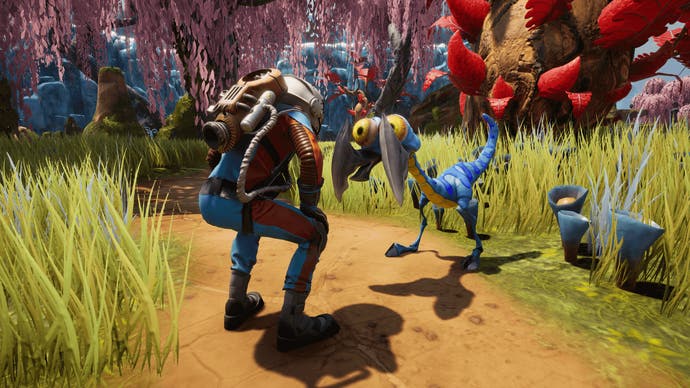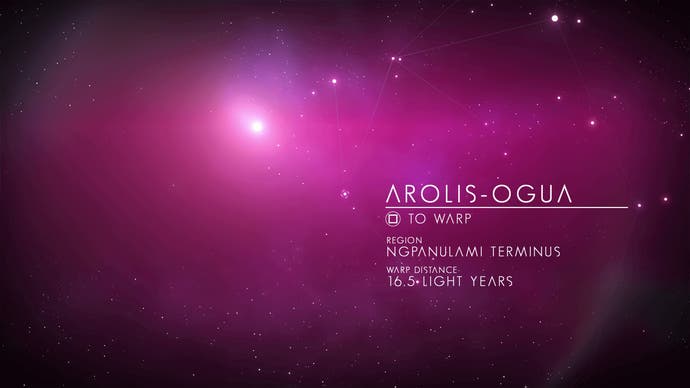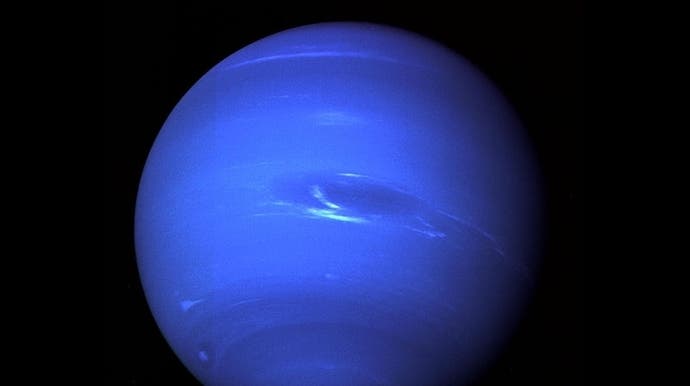Space is incredible, but too many games are missing the point
Comet me bro.
I only really noticed this recently, but I am big into Neptune. I'm into a lot of planets, to be honest, because I just think planets are pretty interesting, but there's something about Neptune - above the big, beige, sickly '70s kitchen swirls of Venus, Jupiter and Saturn, or the slightly threatening blankness of Uranus, or Mercury (boring), or Mars (old news, too many dead robots) - that makes Neptune stand out.
I think a lot of it is how it's pictured, which itself is obviously a lot to do with just how far away it is. We've only ever sent one spacecraft (Voyager 2, in the '80s) far enough out there into the abyss to actually capture images of Neptune up close. It's the only planet in our solar system so far away that it can't be seen without a telescope. The only one, as a result, the world's ancient civilizations never discovered - and doesn't it look the part? It feels like every image of Neptune is the same: deep, magnetic, hungering blue with the odd streak of white, stark against pure black. Massive, terrifying. I love it because it just seems so completely unknowable. If I think for too long about what it would be like to see Neptune in person I start to feel a little sick, like vertigo, or a sort of inverse claustrophobia. The same sense of cloying panic only from being so totally overexposed and far away, cut off and adrift, not just from Earth and home and people but from everything. From infinity! Eugh.

Anyway, I got to thinking about Neptune because I was, first, thinking about why some recent space-faring games - that I promise I want to love - have been so good at putting me off. Journey to the Savage Planet is the obvious one, but there's also The Outer Worlds which, to someone who has no desire to play any more of either, might as well be the same thing. The trend in these sorts of space games, it seems, is to use that setting's infinite opportunity for invention to make slightly wet, slightly clunky, slightly (but not entirely) self-aware London Underground poster jokes about capitalism and consumer culture - and to ignore all the actual space stuff.
The real tragedy though, more than just the moustache-twiddling zingers, is the sheer amount of clutter, and that's a fault that lies with games as a thing more than a couple of unlucky examples. Games in search of a wide audience are compelled to give you something to do. You can't go to a planet and find out it's just a big, dry, empty red rock. Or a swirling mess of thick gas and heavy, half-frozen liquid. It's not fun! So we get purple grass and jumbo flowers and little giggling critters, all a bit foreign-looking but mostly just spliced across two earthly concepts, that just so happen to be the perfect height to pet or harvest or loot for resources from which to craft. We get the not-so-savage planet.

For the likes of The Outer Worlds and Journey to the Savage Planet, this is arguably quite forgivable. They're trying to do different things, in different ways, to other games and works set in space. Arguably they could have done those things anywhere, and space itself is absolutely wasted on them, but regardless the greatest frustration is with another game entirely. One that looked, at first, to really, truly get it. The real disappointment is No Man's Sky - or rather, No Man's Sky's big Next update, and more recently the one that came with Beyond.
I find it hard to think of a better example of a studio not understanding their own magic than with No Man's Sky. The base, original game, with its empty dirt-brown planets and lonely, unmanned outposts was magic. The loneliness was the magic. The classic No Man's Sky was the closest video games have ever come to 2001: A Space Odyssey, the obvious references notwithstanding. Solitude and silence and, dare I say it, occasional boredom, spread out across a layer of existential genius, was something to be found in both. The lack of other players is the point. The lack of things to meaningfully do is the point. There were breadcrumbs of an old civilization, but they're probably long gone. There were a handful of characters dotted around the galaxy, but they were hard to understand and, even if you could translate the chatter, there was very little of actual meaning or consequence that they had to say. This was a game about drifting, alone, from one great, inhospitable giant to the next. It was a game about being crushed under the weight of your own thoughts. A few bings and boongs of equipment, the odd little creature if you were lucky, but otherwise: nothing.
The updates since, at the steaming request of fans, have brought with them a sense of unending life. You can now craft bases, and build cool stuff that you could probably build a bit easier in Minecraft, and hang out with friends, and visit the social hub where people can jump on your head and queue up to receive quests from the great quest-giving machine. What it brought is a sense of industrialised, homogenised, mass-produced checklist-fun. Content and clutter at the expense of natural magic. In other words, exactly what those quippy workplace posters and sidekick robots are on about in The Outer Worlds and Journey to the Savage Planet. Poetic!
Really, to bring it back to my good friend Neptune, the point here is that there is a vast - literally vast - opportunity going to waste. The fact that sci-fi and, within it, outer and inner space sci-fi has been such a home for humanity's great existential stories is not a coincidence. 2001 is the obvious one yes, but also Solaris, or the close horror cousin Alien, or the modern imitators like First Man and Ad Astra or even just the hints at off-world emptiness in Blade Runner. Even the moments in FTL - one of the few games, alongside Outer Wilds, that actually gets it - where you just sit there after a battle and silently drift amongst the stars. All of them use space for what it is: the perfect backdrop, the perfect threatening, isolating environment for introspection. The void that stares back, and all that.

You don't even have to go as far as Neptune to get it. Sometimes I think about what it'd be like to go to the Moon - or better yet play a game about it, seeing as I'll obviously never really go - and I'm really not sure why we haven't nailed it yet. You'd go to the Moon, in this game or in reality, and when you arrived you'd stand and you'd see Earth, distant and quite upsettingly alone in all that empty black, and you'd think: "We are very small, what is the point of it all?" And then, at the very least, you'd hope that game would have something to say about it.










